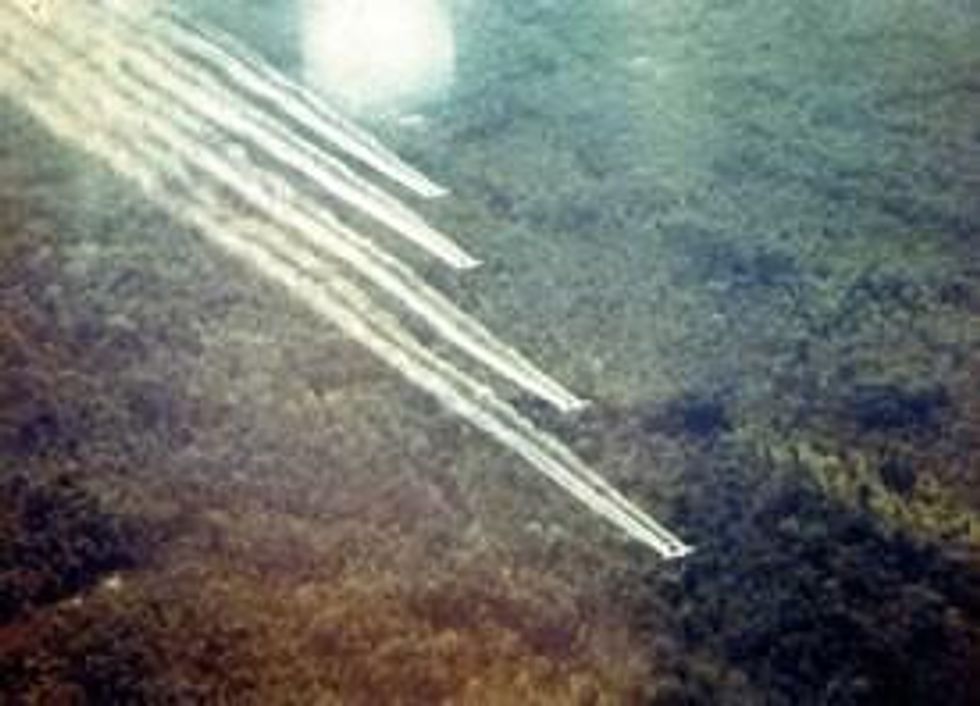Multinational agricultural biotech corporation Monsanto, known as the creator of chemical weapon Agent Orange, is attempting to infiltrate Vietnam once again -- this time as GMO dealer.
Agent Orange, used for chemical warfare in the Vietnam War, is estimated to have killed 400,000, deformed 500,000 and sickened another 2 million.
"Between 2.1 to 4.8 million Vietnamese were directly exposed to Agent Orange and other chemicals that have been linked to cancers, birth defects, and other chronic diseases during the war that ended in 1975, according to the Vietnam Red Cross," Thanh Nienn News writes.
30 years after the war, three generations have suffered from the effects of Agent Orange.
Now, as Monsanto seeks to reap profits in Vietnam once again, this time through agribusiness, many are speaking out against the corporation as well as the potential effects of the GM seeds and herbicides that Monsanto seeks to sell.
* * *
Thanh Nienn News in Ho Chi Minh Cityreports:
No biotech company has yet got the official green light for selling genetically modified organisms (GMOs), but it does not assuage the fears that Vietnam could end up with another tragic legacy from a company that once caused many deaths in the country, environmental activists say.
It would be ironic if Vietnam becomes a willing party to a "lethal" product made by the same US company that manufactured Agent Orange, the toxic defoliant used during the Vietnam War.It would be ironic if Vietnam becomes a willing party to a "lethal" product made by the same US company that manufactured Agent Orange, the toxic defoliant used during the Vietnam War, they pointed out. [...]
In 2006 the government approved a blueprint that envisaged covering between 30 percent and half of the country's agriculture lands with the controversial gene-altered crops by 2020.
Only three companies - Monsanto, Syngenta, and Pioneer - have been licensed to carry out lab research and tests in Vietnam, the minister's statement said.
Monsanto accounts for almost one-quarter (23 percent) of the global proprietary seed market.
[Senior Lieutenant General Nguyen Van Rinh, former deputy defense minister, chairman of the Vietnam Association of Victims of Agent Orange] is also worried about the weedkiller Roundup Monsanto plugs for use along with its crops.
"By introducing [GMOs] paired with toxic weed killers, the tragic legacy of Agent Orange might repeat itself," he warned. [...]
Jeffrey Smith, author of the bestseller
Seeds of Deception and founder and executive director of the California, US-based NGO
Institute for Responsible Technology, said: "It is not inconsequential that a new genetically modified corn up for review is designed to be tolerant to the herbicide 2,4-D, a component of Agent Orange.
"This means that much higher amounts of toxic 2,4-D will drench the agricultural lands where this new crop is planted.
"It would be a harsh and ironic consequence if Vietnamese people suffer from birth defects from both of these Monsanto products, Roundup and Agent Orange."
* * *
The Global Postreports:
Monsanto is, of course, highly aware of Agent Orange's reputation and has fought numerous lawsuits filed by chemical's victims both Vietnamese and American. The chemical, commissioned by the U.S. military, was dumped over jungles to kill vegetation and rout communist forces.
In Monsanto's own primer on the Agent Orange era, it casts the chemical as patriotic -- it was meant "to save the lives of U.S. and allied soldiers," Monsanto says -- and contends that the matter "should be resolved by the governments that were involved."
Keeping Monsanto out of Vietnam already appears to be an uphill fight.
A Vietnamese legislator and former deputy defense minister has, according to Thanh Nien, faced evasion when he tried to raise the issue with the [government].
# # #


